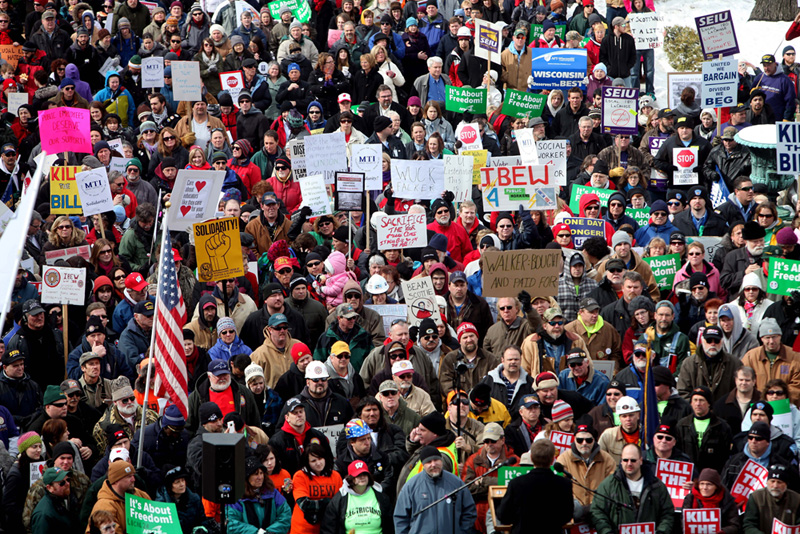MADISON, WI — It has been a wild first day for me reporting in Madison, Wisconsin, where protests have been going non-stop at the state Capitol against Republican Gov. Scott Walker’s budget proposal, which would not only require greater employee contributions to state benefits packages but also strip state employees of most of their collective bargaining and union rights.
As I write this, I sit inside the state Assembly chamber, where members of the Democratic minority have been speaking almost non-stop against the bill, with only occasional speeches by Republicans or questions from the GOPers to the Dems. But they aren’t the only voices being heard in this chamber — there is an ever-present sound of demonstrators in the Capitol building, chanting and banging drums against the proposal. Their volume rises and falls, from a subtle background noise to clearly audible objections inside the chamber.
When Walker’s address to the state this evening, which was billed by the media as a fireside chat, came on the monitor screens in the Capitol from Wisconsin Eye — the state equivalent of C-Span –Â I could not hear even one word. He was instead drowned out by the protesters, who reached possibly their loudest volume of the whole day.
In order to understand why this proposal has struck a raw nerve in Wisconsin, to the point of having thousands or even tens of thousands of demonstrators picketing the Capitol day and night, it is important to understand the nature of progressive politics in the state — something I learned firsthand when I was a resident of the state for six years. The Democratic Party in Wisconsin is, to an extent that is not true in most other states, a genuine labor party — a party with deep ties to unions, with many politicians who have also been union officials, and which speaks for organized labor in key debates.
As such, a change to the state’s union laws that would threaten the existence of organized labor in Wisconsin, would in turn threaten the existence of something else — the Democratic Party in Wisconsin as people have known it for over half a century.
This idea — that Walker’s attempt to weaken unions is an attempt to weaken the Democrats — became quite clear in a passionate floor speech from state Rep. Cory Mason (D), a former official with Wisconsin’s division of the American Federation of Teachers. “There won’t be labor peace in this state for a long time to come,” Mason said, “if we’re gonna take away people’s rights.”
And Mason cited an unnamed Republican legislator, who Mason said told him that “unions have outlived their usefulness, and they give way too much money to political campaigns on your side.” Mason drew from this that Walker’s proposal was nothing than attempt to wipe out the political opposition.
“I think this is like the Sedition Act of 1798,” Mason said, “when the Congress in a young country decided that it didn’t like what its political opponents had to say.”
State Rep. Jon Richards — who during my years in Wisconsin had a reputation as being a centrist Dem — fluidly spoke in the pro-labor language of the rest of his caucus. Regarding Walker’s fireside chat, Richards said: “Given the size of his power grab, maybe we should call it ‘The King’s Speech.'” Richards spoke admiringly of “the solidarity from our brothers and sisters in organized labor,” including those who are not public employees, who have marched in opposition to the bill.
Dems’ labor ties are conspicuous in another way: The Democratic legislators have been wearing bright orange T-shirts declaring, “Assembly Democrats FIGHTING FOR WORKING FAMILIES.” The shirts were in fact all made at the printshop business of state Rep. Mark Pocan, a union shop that is affiliated with the International Union of Painters and Allied Tradesmen. The T-shirts have visible union logos identifying the source of the printing.
Among Dem-leaning Wisconsin voters, and many swing voters, who have never belonged to unions, there remains a deep affection for them as institutions, crediting them with social progress. These voters believe that they are better off as individuals because of unions being around, even if they have never had occasion to join them.
There is, of course, a flip-side to this — many other voters, who might not dislike unions per se, think that unions have it a little too good, make things too hard for businesses, or are the cause of too much government spending.
But Walker appears to have stepped in a beehive, by seeking not to drive a hard bargain with the public employee unions — such as financial concessions as part of an austerity package — but to not bargain with them at all, and to remove their bargaining rights entirely. If Walker had only forced the financial concessions, without the other provisions to weaken the structures of the public employee unions, this story probably would never have exploded onto the national scene.
For example, while walking up the street to get to the Capitol building, I encountered a firefighter — whose profession is being exempted from Walker’s plan — who was carrying an anti-Walker sign. While interviewing the man, I noted that firefighters are exempt.
“For now,” the firefighter replied. “It’s basically a union thing, anti-collective bargaining, union-busting that he’s [Walker] doing. Divide and conquer. We don’t believe in that. And you know, he might give us a bye this year — but next year, he can always come back and go after us. The exemption, there’s no guarantee that’s gonna last forever and ever, and I doubt it would.”









